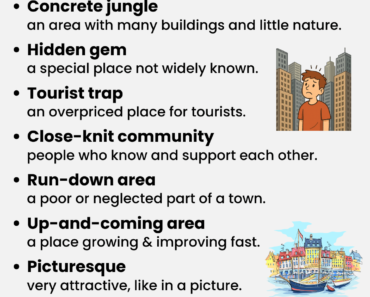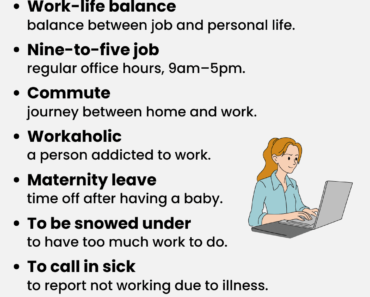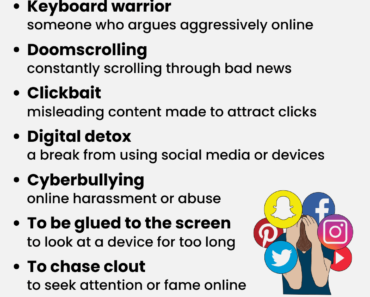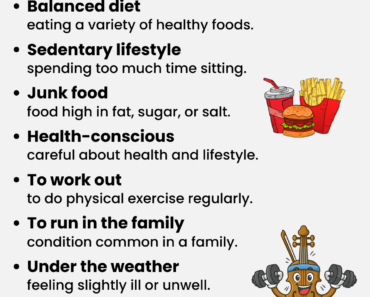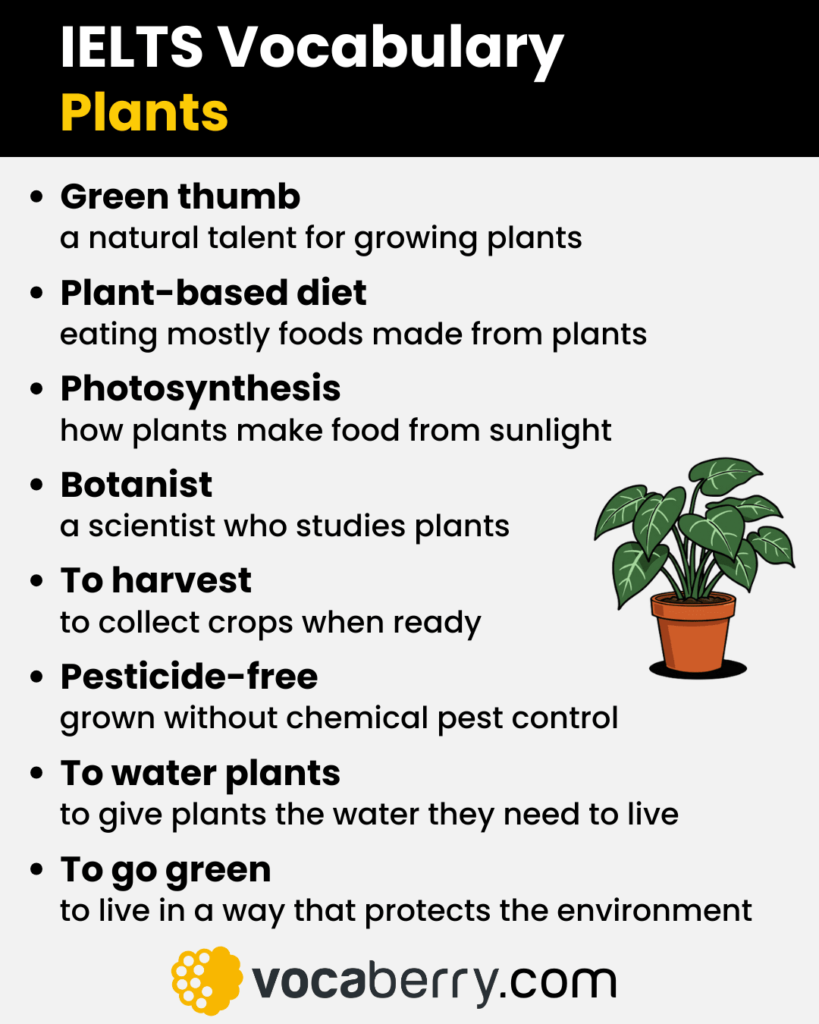
Plants are a common topic in the IELTS Speaking test. Examiners may ask you about your favorite plants, how you take care of them, the role of plants in daily life, and environmental issues like deforestation. In this guide, you’ll learn useful IELTS vocabulary for plants with clear definitions, followed by IELTS Speaking Part 1, Part 2, and Part 3 questions with sample answers.
IELTS Vocabulary for Plants
Here is some useful IELTS vocabulary for talking about plants with clear definitions. These words and phrases will help you give better answers in the IELTS Speaking test.
- Green thumb – a natural talent for growing plants successfully.
- Flora – all the plant life in a particular area
- Endemic species – plants native to and only found in one region
- Deciduous – plants that shed their leaves seasonally
- Evergreen – plants that stay green all year
- Perennial – a plant that lives for more than two years
- Vegetation – all the plant life in a particular region.
- Plant-based diet – eating mostly foods made from plants
- Photosynthesis – how plants use sunlight to make food
- Pollination – the process that helps plants produce seeds
- Germination – when a seed begins to grow
- Seed dispersal – the spreading of seeds by wind, animals, or water
- Windowsill – flat space at the bottom of a window, often for plants.
- Botanical garden – a place where many types of plants are grown and studied
- Botanist – a scientist who studies plants.
- Nursery – a place where young plants are grown and sold.
- Biodiversity – the variety of plant and animal life in an area
- Horticulture – the practice of growing plants and gardening
- Reforestation – planting trees to replace those that were cut down
- Afforestation – planting trees in places that weren’t forests before
- Deforestation – cutting down trees and destroying forests
- Organic farming – growing crops without chemicals
- Compost – decayed plant matter used to enrich soil
- Fertilizer – a substance that helps plants grow
- Vertical farming – growing crops in stacked layers or urban setups
- Sustainable farming – growing crops without harming the environment
- Predominant species – the most common or dominant species in an area.
- Environmental stewardship – caring for nature responsibly
- Herbal remedies – medicines made from plants
- Medicinal plants – plants used to treat illness or improve health
- Climate-resilient crops – plants that survive extreme weather
- Drought-tolerant plants – plants that need little water
- Eco-friendly – not harmful to the environment
- Carbon dioxide – the gas plants absorb from the air
- Oxygen – the gas plants release during photosynthesis
- Carbon sequestration – when plants absorb and store carbon dioxide
- Soil erosion – the loss of soil due to plant loss or overuse
- Invasive plant – a harmful, fast-spreading non-native plant
- Green space – open areas filled with plants and trees in urban areas
- Greenhouse – a glass building for growing plants in controlled conditions
- Greenhouse effect – warming caused by trapped gases, affected by deforestation
- Urban gardening – growing plants in city environments like rooftops or balconies.
- Zero-waste gardening – growing plants in a way that avoids producing waste
- Pesticide-free gardening – growing plants without using chemical pest control.
- To cultivate – to prepare and use land for growing plants
- To fertilize – to add nutrients to soil to help plants grow.
- To harvest – to collect crops when they are ready
- To wither – to dry up or die due to lack of water
- To wilt – to become limp due to heat or lack of water
- To blossom – to produce flowers
- To decompose – to break down naturally over time
- To prune – to cut branches to help plants grow better
- To protect the environment – to take care of nature
- To water plants – to give plants the water they need to live.
- To go green – to live in a way that protects the environment
IELTS Speaking: Plants Questions & Answers
In this section, you’ll find IELTS Speaking Part 1, Part 2, and Part 3 questions on plants with sample answers. These examples show how the plant-related vocabulary can be used in your responses during the test.
IELTS Speaking Part 1 – Plants
Do you like growing plants?
Yes, I really enjoy it. I’ve recently started learning how to cultivate herbs and vegetables at home. It’s satisfying to see them germinate and grow, especially when you use compost instead of chemical products. It also makes me feel more connected to the environment.
Are you interested in how plants affect the environment?
Yes, very much. I’m especially curious about topics like deforestation, reforestation, and how photosynthesis helps reduce carbon dioxide levels. I believe understanding these concepts is essential if we want to protect the environment.
What’s something you’ve learned about plants that surprised you?
I recently learned how some drought-tolerant plants can survive with almost no water, thanks to adaptations in their leaves. I was also surprised at how climate-resilient crops are being developed to deal with extreme weather. It shows how crucial plants are to our future.
What types of plants are common in your country?
That depends on the region, but in general, you’ll find a mix of deciduous and evergreen plants. In urban areas, people grow medicinal plants and vegetables at home, while rural areas are more focused on sustainable farming and even vertical farming nowadays.
IELTS Speaking Part 2 – Plants Cue Card
Describe a plant you find useful or interesting.
You should say:
- what it is
- where it grows
- how you know about it
- and explain why you think it’s useful or interesting.
Sample Answer:
One plant I find really useful and quite interesting is aloe vera. It’s a popular medicinal plant with thick, fleshy leaves filled with gel that’s often used in herbal remedies. People commonly apply it to treat burns, skin irritation, and even minor cuts. What makes it stand out to me is that it’s a drought-tolerant plant, which means it needs very little water, so even people without a green thumb can grow it easily.
Aloe vera grows well in warm, dry regions, but it also does great indoors. I actually keep mine on the windowsill in my kitchen. I first learned about it through a documentary on eco-friendly living, and since then, I’ve noticed it’s used in everything from skincare to natural cleaning products. What’s even better is that I grow it at home using compost instead of chemical fertilizer, which makes it part of my small zero-waste gardening effort.
I like that it supports environmental stewardship because it encourages using natural solutions over store-bought ones. What’s more, having a few plants at home, including aloe vera, brings a touch of green space into my everyday life and helps me feel more connected to nature. So overall, I think aloe vera is not just easy to grow, but also plays a small part in living more eco-friendly and health-conscious. It’s a simple plant that fits perfectly into a sustainable lifestyle.
IELTS Speaking Part 3 – Plants Discussion
IELTS Speaking Part 3 questions about plants often ask you to talk about their role in daily life, environmental issues, and the importance of trees and greenery. You may also be asked to share your views on deforestation, gardening, or the benefits of nature.
Do you think it’s important to protect rare plant species?
Absolutely. I believe it’s vital to protect rare and endemic species because their loss could disrupt entire ecosystems. These plants often play a unique role in supporting biodiversity, and many have the potential to become sources of future medicinal plants or climate-resilient crops. Since many of them are at risk due to habitat destruction, protecting them in botanical gardens or through conservation efforts is essential. It’s not just about preserving beauty but also about safeguarding ecological balance and valuable natural resources.
How can we protect plants and forests?
Protecting plants and forests requires action at both the individual and governmental level. On a broader scale, authorities should invest in reforestation and protect endemic species that are vulnerable. These steps help preserve biodiversity and reduce soil erosion in fragile ecosystems. On a personal level, people can support organic farming, use natural fertilizer, and avoid contributing to deforestation through overconsumption. Promoting environmental stewardship through education and stricter policies is also essential for long-term sustainability.
How can schools teach children about plants?
Schools can educate children about plants by combining theory with hands-on experience. For instance, building small greenhouses or creating urban gardening spaces helps students see how seeds germinate and grow. Teaching concepts like photosynthesis, the role of carbon dioxide, and the value of green space can raise awareness about the environment. Activities like pesticide-free gardening or using compost instead of chemicals help children develop sustainable habits early on. This not only enhances their understanding of plant life but also builds a lasting sense of environmental responsibility.
Why do some people choose to grow their own food instead of buying it?
Many people grow their own food to have more control over what they consume. Those who practice organic farming or small-scale gardening often avoid harmful chemicals and use natural fertilizers or compost, which makes their produce healthier and safer. It’s also more sustainable, as home gardening reduces packaging waste and transport emissions. Some see it as a way to go green and live more consciously. On top of that, it can be rewarding and educational, especially when people see seeds germinate and finally harvest what they’ve grown.
More IELTS Vocabulary Topics
If you found this lesson useful, explore other IELTS Speaking topics to expand your vocabulary and practice with sample answers:
- IELTS Vocabulary: Accommodation
- IELTS Vocabulary: Advertisement
- IELTS Vocabulary: Animals
- IELTS Vocabulary: Art
- IELTS Vocabulary: Artificial Intelligence
- IELTS Vocabulary: Books
- IELTS Vocabulary: Childhood
- IELTS Vocabulary: Crime and Punishment
- IELTS Vocabulary: Culture and Traditions
- IELTS Vocabulary: Daily Routine
- IELTS Vocabulary: Education
- IELTS Vocabulary: Environment
- IELTS Vocabulary: Family
- IELTS Vocabulary: Fashion and Clothes
- IELTS Vocabulary: Films
- IELTS Vocabulary: Food & Diet
- IELTS Vocabulary: Friends
- IELTS Vocabulary: Gifts
- IELTS Vocabulary: Health
- IELTS Vocabulary: Hobbies
- IELTS Vocabulary: Hometown
- IELTS Vocabulary: Money
- IELTS Vocabulary: Museums
- IELTS Vocabulary: Music
- IELTS Vocabulary: Shopping
- IELTS Vocabulary: Social Media
- IELTS Vocabulary: Sports
- IELTS Vocabulary: Technology
- IELTS Vocabulary: Transport
- IELTS Vocabulary: Travel
- IELTS Vocabulary: Weather
- IELTS Vocabulary: Work & Jobs

